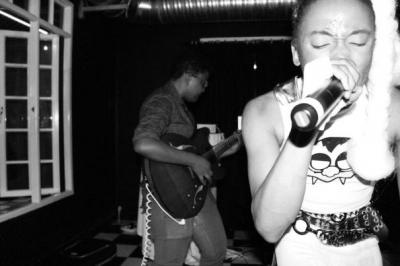Surviving in South Africa’s Queer Scene
For the South African artist Umlilo music is freedom and therapy at the same time. In his music he addresses issues of homophobia and bends the common images of gender. «Gender has always been something very natural to me to fuck with», he explains in the Norient podcast. A podcast from the Norient exhibition Seismographic Sounds, produced by Leila Dee Dougan.
I’m Siya, I go by the artist name Umlilo, which means «fire» in Xhosa. I dress different, I do my hair different, and I present myself as androgynous. I don’t care about how a man, a woman or a gay man is supposed to look, act or sound. I see myself as a creature who walks around and gives people a mind fuck about what they think gender is. My performance and my music videos reflect this, but on a much more exaggerated level.
My music, for me, is my freedom and my therapy. But I never thought I was going to be a full-time musician. I had a nine-to-five dead-end job and all I was doing when I came home was making music, by myself, for myself. I’m a curious cat and so I started to play around with different sounds. Many of them were inspired by my frustration at work. Then, I started to use my bedroom as a recording studio and by-and-by I realized how music can impact people. I was thinking: «When you’re in your bedroom producing a song it can also be something that other people may be interested in».

A part of me as an artist always wanted to make it in South Africa and I think a lot of who I am is because I grew up here. I’ve seen very different faces of this country: I was raised in a township, but I went to a «Model C» school and studied at Rhodes University. Now I live in the suburbs, but I still take public transport. And I observe the class struggle that is going on: for a black queer person living in a township it’s a completely different experience than for a black queer person living in the suburbs. So Cape Town’s worldwide image as a place in which gay people can come and celebrate is not the full truth.
In my songs I address the issue of homophobia because it makes me sad to see that while before the color of a person’s skin was the main item for discrimination, now it’s that person’s sexuality. The same people who are now oppressing others because of their desire, have been through that oppression themselves. It’s surprising that they would perpetuate the same kind of hate. I always feel we don’t want to fight. No one ever wants to be an activist. But often I find myself in that position. It’s do or die.
This quote was recorded by Leila Dee Dougan via Skype in March 2015. The text was published first in the second Norient book Seismographic Sounds.
Biography
Biography
Shop

Published on October 15, 2018
Last updated on June 28, 2022
Topics
From classism in techno clubs to clashing ideals of masculinity in Brazilian «bate bola».
Desires are produced personally and impersonally: About music as desiring machine and the elasticity of bodies.
Can a bedroom producer change the world? How do artists operate in undersupplied conditions?
Queer is a verb, not a noun. Thinking & acting queerly is to think across boundaries, beyond what is deemed to be normal.